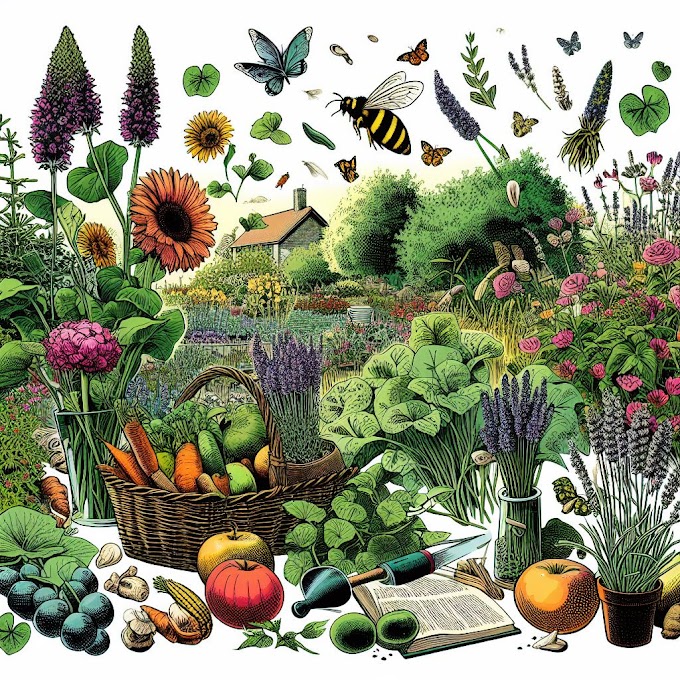Plants That Repel Mosquitoes

Transforming your outdoor space into a tranquil retreat where you can relax and unwind often comes with the challenge of dealing with pesky mosquitoes. However, with the right selection of plants, you can naturally repel these bothersome insects while adding beauty and fragrance to your garden. Incorporating mosquito-repelling plants not only helps to keep these pests at bay but also creates a more enjoyable outdoor environment for you and your family to enjoy. In this article, we'll explore a variety of plants known for their mosquito-repelling properties, helping you create a welcoming and mosquito-free oasis in your outdoor space.
Here's a list of plants that are known for their mosquito-repelling properties:
1. Citronella: Citronella plants, particularly citronella grass (Cymbopogon nardus), are well-known for their strong scent that repels mosquitoes. Plant them in pots or in the ground around outdoor seating areas to help keep mosquitoes at bay.
2. Lavender: Lavender (Lavandula angustifolia) not only has a delightful fragrance but also repels mosquitoes with its strong aroma. Plant lavender in sunny areas of your garden or near windows and doorways to help deter mosquitoes.
3. Marigolds: Marigolds (Tagetes spp.) contain compounds that mosquitoes find repulsive. Plant them in flower beds, borders, or containers around your outdoor living spaces to help repel mosquitoes while adding vibrant color to your garden.
4. Peppermint: Peppermint (Mentha x piperita) has a refreshing scent that mosquitoes dislike. Plant peppermint in pots or in the ground around patios, decks, and entryways to help keep mosquitoes away.
5. Basil: Basil (Ocimum basilicum) emits a strong aroma that mosquitoes find unpleasant. Plant basil in herb gardens, containers, or mixed plantings around your home to help repel mosquitoes while providing fresh herbs for cooking.
6. Lemon Balm: Lemon balm (Melissa officinalis) has a citrusy scent that mosquitoes dislike. Plant lemon balm in pots or in the ground near outdoor seating areas to help deter mosquitoes while adding a pleasant fragrance to your garden.
7. Rosemary: Rosemary (Rosmarinus officinalis) is known for its aromatic foliage that repels mosquitoes. Plant rosemary in sunny locations near patios, decks, or entryways to help keep mosquitoes away while enjoying its culinary uses.
8. Catnip: Catnip (Nepeta cataria) contains a compound called nepetalactone, which is known to repel mosquitoes. Plant catnip in pots or in the ground around outdoor living areas to help deter mosquitoes while attracting cats (if you have them!).
9. Lemon Verbena: Lemon verbena (Aloysia citrodora) emits a lemony scent that mosquitoes find unpleasant. Plant lemon verbena in containers or in the ground near outdoor seating areas to help repel mosquitoes while enjoying its fragrant leaves in teas or culinary dishes.
10. Geraniums: Certain scented geraniums, such as Pelargonium citrosum, are believed to repel mosquitoes with their lemony fragrance. Plant scented geraniums in pots or in the ground around outdoor living spaces to help deter mosquitoes while adding beauty to your garden.
These plants can complement other mosquito control measures such as mosquito repellents, citronella candles, and mosquito traps to help create a more enjoyable outdoor environment during the warmer months.
Tips for Using Mosquito-Repelling Plants:
1. Strategic Placement: Place mosquito-repelling plants strategically around outdoor seating areas, patios, decks, and entryways to create a barrier against mosquitoes. Consider planting them in pots or containers that can be easily moved to different locations as needed.
2. Group Plantings: Create clusters or groupings of mosquito-repelling plants to maximize their effectiveness. Planting them in close proximity can amplify their scent and create a stronger deterrent against mosquitoes.
3. Companion Planting: Incorporate mosquito-repelling plants into your existing landscape design by interplanting them with other ornamental plants, herbs, or vegetables. This not only helps to repel mosquitoes but also adds diversity and visual interest to your garden.
4. Regular Maintenance: Keep your mosquito-repelling plants healthy and vigorous by providing them with adequate sunlight, water, and nutrients. Prune them regularly to encourage bushy growth and remove any dead or damaged foliage.
5. Harvesting Herbs: If you're growing mosquito-repelling herbs like basil, peppermint, or lemon balm, consider harvesting them regularly for culinary or aromatic purposes. This not only helps to keep the plants compact and healthy but also releases their natural oils, enhancing their mosquito-repelling properties.
6. Container Gardening: If you have limited space or live in a rental property, consider growing mosquito-repelling plants in containers or pots. This allows you to easily move the plants around to different areas of your outdoor space and provides flexibility in plant placement.
7. Mulching: Apply a layer of organic mulch, such as wood chips or shredded bark, around mosquito-repelling plants to help retain moisture, suppress weeds, and improve soil health. Mulching also adds a finished look to your garden beds and helps to conserve water.
8. Companion Plants: Consider incorporating other companion plants known for their mosquito-repelling properties, such as garlic, rosemary, or chrysanthemums, into your garden design. These plants can complement your existing mosquito-repelling plants and provide additional protection against mosquitoes.
By incorporating these tips into your gardening routine, you can effectively use mosquito-repelling plants to create a more enjoyable outdoor environment while reducing your reliance on chemical insecticides and repellents. Experiment with different plant combinations and placement strategies to find what works best for your specific outdoor space and needs.
In addition to the plants mentioned earlier, there are several other plants that are known for their mosquito-repelling properties.
Here are a few more:
1. Garlic (Allium sativum): The strong aroma of garlic is believed to repel mosquitoes. Planting garlic in your garden or using garlic-based sprays can help keep mosquitoes away.
2. Chrysanthemums (Chrysanthemum spp.): Certain varieties of chrysanthemums contain pyrethrin, a natural insecticide that repels mosquitoes and other insects. Planting chrysanthemums in your garden can help deter mosquitoes while adding beauty to your landscape.
3. Catnip (Nepeta cataria): Catnip contains a compound called nepetalactone, which has been found to be more effective at repelling mosquitoes than DEET, the active ingredient in many commercial insect repellents. Planting catnip in your garden can help keep mosquitoes at bay while attracting cats.
4. Pennyroyal (Mentha pulegium): Pennyroyal is a member of the mint family known for its strong aroma that repels mosquitoes. Planting pennyroyal in pots or in the ground around outdoor seating areas can help deter mosquitoes while adding a pleasant fragrance to your garden.
5. Tansy (Tanacetum vulgare): Tansy is a perennial herb with aromatic foliage that repels mosquitoes and other insects. Planting tansy in your garden or using dried tansy leaves in sachets can help keep mosquitoes away.
6. Wormwood (Artemisia absinthium): Wormwood contains compounds that repel mosquitoes and other insects. Planting wormwood in your garden or using dried wormwood leaves in sachets can help deter mosquitoes while adding a unique texture to your landscape.
7. Basil (Ocimum basilicum): In addition to its culinary uses, basil emits a strong aroma that mosquitoes dislike. Planting basil in pots or in the ground around outdoor seating areas can help keep mosquitoes away while providing fresh herbs for cooking.
8. Lemon Thyme (Thymus citriodorus): Lemon thyme is a variety of thyme with a lemony scent that repels mosquitoes. Planting lemon thyme in pots or in the ground near outdoor living areas can help deter mosquitoes while adding a pleasant fragrance to your garden.
These additional plants can complement the ones mentioned earlier, providing you with a variety of options for creating a mosquito-free outdoor environment while enhancing the beauty and diversity of your garden.
























